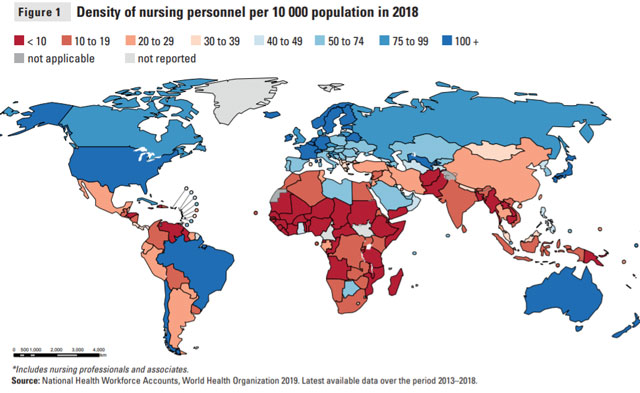
‘Health for All’ does not mean an end to disease and disability, or that doctors and nurses will care for everyone
COMMENT | Judith Hope Kiconco | It’s already March, the last month of the first quarter of 2021 and we are still in challenging times full of uncertainty due to COVID-19. There is little to cling on as the world keeps moving and waits for no man. Unplanned eventualities such as pandemics, political tension, financial hardships are worsening the already worrying circumstances. Like everyone else, nurses and midwives are also in this struggle. So how do we keep up? What do we have to do to stay relevant, to keep up with the times and serve to the best of our abilities.
The State of the World’s Nursing Report 2020 cites the nursing workforce as the world’s largest single occupation in the health sector and a foundation of the inter-professional health teams that deliver on the promise of health for all.
According to the World Health Organisation, ‘Health for All’ does not mean an end to disease and disability, or that doctors and nurses will care for everyone. It means that resources for health are evenly distributed and that essential health care is accessible to everyone.
A lot of factors such as resources, leadership, policy need to align for this to be a reality but as nurses and midwives, we can do our bit by keeping up with the trends in the profession and abreast with the changing needs in health.

Below are some of the trends to look out for that would enable us to maximize our potential amidst the challenging times we live in.
Specialization
There is an increased need for specialized nurses globally. Specialization is not only beneficial for career growth of an individual but also shaping the future of healthcare industry.
Cliff Aliga, a Lecturer at Agha Khan University and Critical Care Nurse says specialization provides a nurse with an opportunity to become an expert in a specific area and they can ably influence practice, education, and health outcomes from a knowledgeable standpoint.
A specialized nurse has increased clinical confidence, great decision-making ability, and increased job satisfaction Cliff adds drawing from his experiences as a critical care nurse having trained from Europe six years ago.
Online nursing education
We should embrace online nursing education. For the past few years, our current lifestyle and the economy have dictated that both work and study are equally important. The education system has been flexible enough to cater for this with all sorts of programs to enable learners achieve both study and work with ease.
The modular, evening and weekend have always been handy and of late the online education offered by some institutions like Makerere University School of Public Health (MaKsph) has bridged this critical gap. Several nurses have already benefitted from these and they are here to stay. Take advantage of the online programs both national and international to further your education.
Doctoral education
There is Increasing the need for doctoral education. Uganda had its first PHD nurses more pronounced in 2007 and they had been trained from abroad.
Today there are about 10 nurses with PHDs in country, but this number will hopefully continue to grow bigger. Nurses have realized that they partake in decision-making through higher education because with more knowledge comes empowerment, refined skills, and confidence to discuss issues pertinent to nursing with colleagues, partners and governments says Dr Rose Kyalo Nabirye.
Dr. Nabirye is one of the few PHD nurses and former dean school of Nursing College of Health Sciences Makerere. She adds that Uganda benefits from PHD nurses through their work in different institutions such as universities, government departments, research institutions etc. She however notes a challenge that PHD nurses in Uganda have not yet managed to win big grants to set up research programs as our medical doctor colleagues.
Telehealth
Let’s familiarize ourselves with telehealth: This is where technology meets medicine and is also termed as telemedicine. 2020 saw the growth of Telemedicine globally including in Uganda. Service providers like The medical concierge Group(TMCG) have excelled at this and no doubt with the current trends, telemedicine is going to greater heights. As nurses we need to familiarize ourselves with the do’s and don’ts of telemedicine including but not limited to the rules of informed consent and the increased need for privacy of health-related information.
Like they say, if it does not challenge you, then it will not change you, kudos to the nurses who have already taken up the challenge of matching up the current trends in nursing and for those who are yet to take it up, it’s never too late.
Happy International Year of Health and Care workers !
*****
![]() Judith Hope Kiconco, Nurse & Public Health Specialist
Judith Hope Kiconco, Nurse & Public Health Specialist
 The Independent Uganda: You get the Truth we Pay the Price
The Independent Uganda: You get the Truth we Pay the Price


